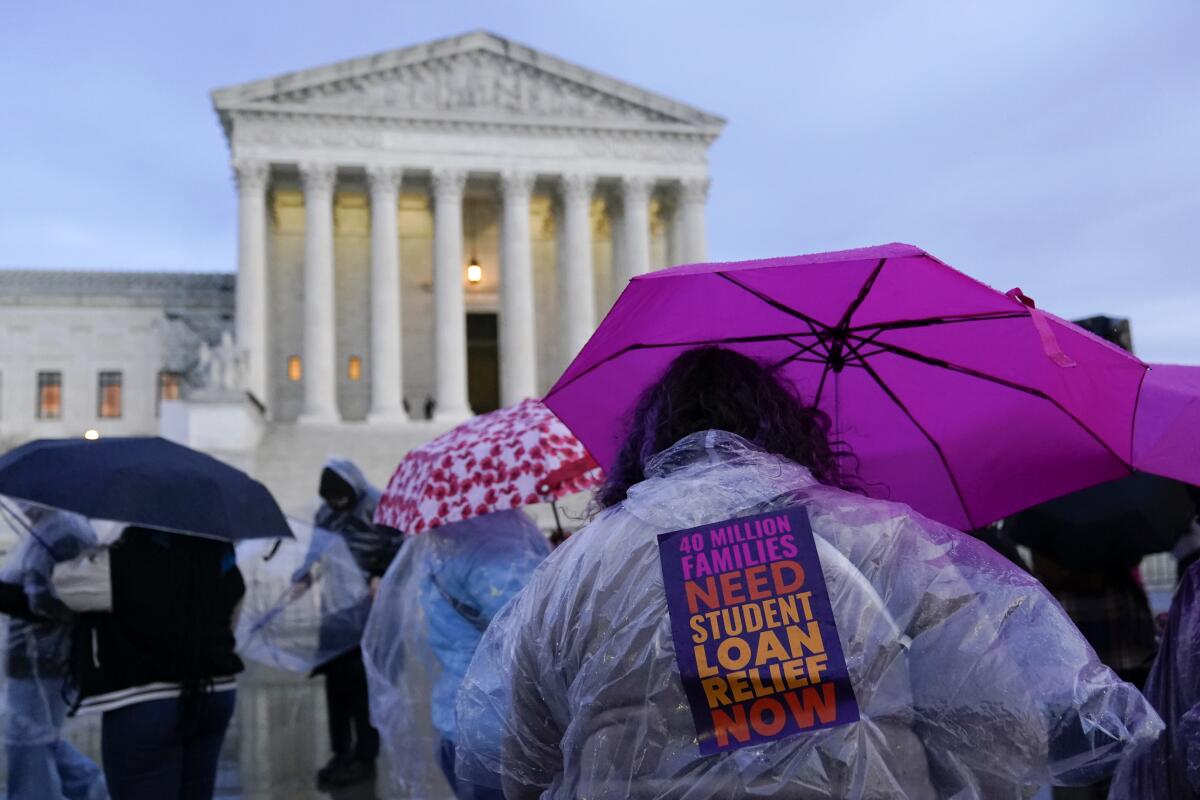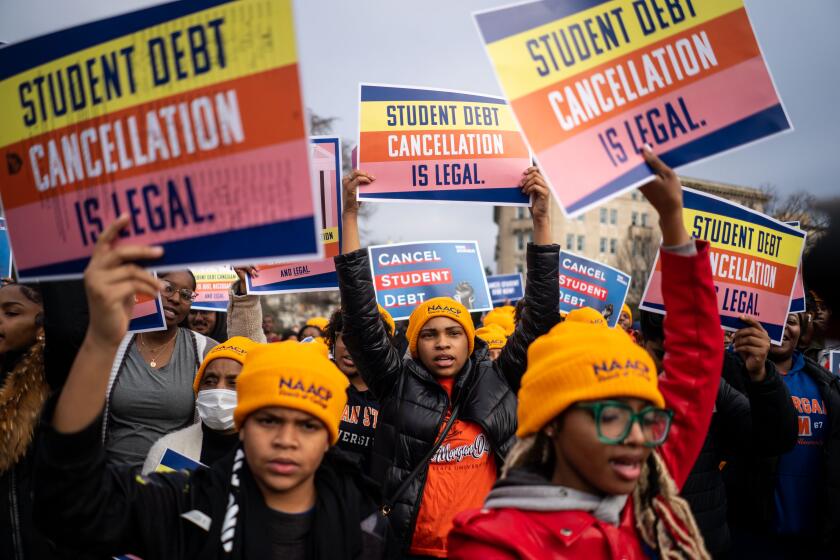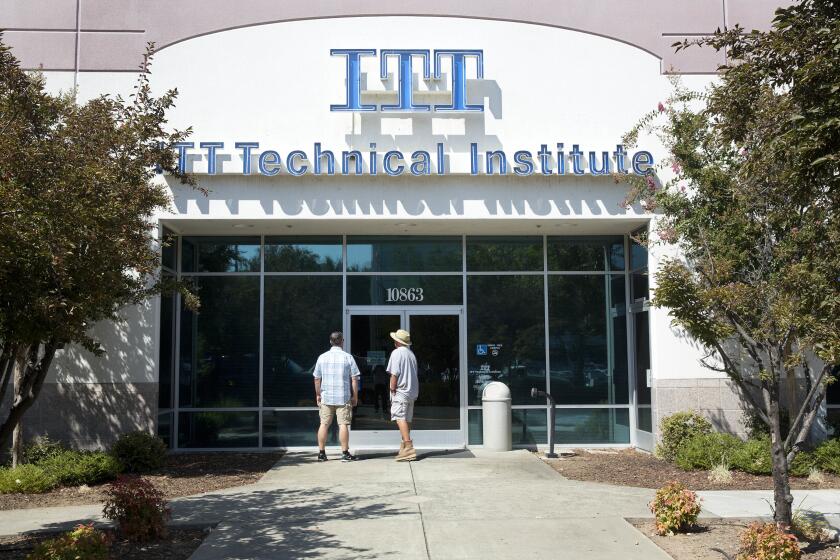Veterans burned by for profit colleges fight for their lost GI Bill benefits

- Share via
WASHINGTON — When her Army career was cut short by a medical discharge in 2005, Tasha Berkhalter decided to pursue a degree that she hoped would lead to a career as an FBI agent. The now-defunct, for-profit ITT Technical Institute promised a flexible class schedule that would meet her needs as a working single mother.
Officials at the school also said that her GI Bill benefits would cover the full cost of tuition, she later testified to the Department of Education. Instead, she graduated in 2010 with a degree that companies didn’t view as valid and, to her surprise, $100,000 in debt.
“I was sick to my stomach,” said Berkhalter, a 41-year-old substitute Spanish teacher based in Lima, Ohio.
Things turned around last year when the Department of Education canceled her federal loan debt through a program for students whose schools have been accused of defrauding them. But the education funding she earned through her time in the Army can’t be restored.
Every year, hundreds of thousands of veterans use GI Bill benefits to pay for college or other educational programs. The funding is meant to be a recruitment tool, an acknowledgment of their service and a springboard to help soldiers transition back into civilian life. But for thousands of veterans, their post-military lives have been disrupted by poor experiences at for-profit colleges accused of defrauding students.
Biden’s plan to forgive up to $20,000 in student loans is held up in the courts. But the administration has already canceled billions in debt.
In recent years, some students who attended for-profit schools have had their loans canceled under a program called borrower defense to repayment, which protects loan holders from having to pay back federal loans to schools that misled them.
Under the Biden administration, more than 1 million students of schools such as ITT Technical Institute, DeVry University and Corinthian Colleges have had billions canceled under the program, including veterans like Berkhalter.
Last August, the Department of Education announced that it would cancel all remaining federal student loan debt people took out to attend ITT Technical Institute from 2005 to its closure in 2016, resulting in an additional $3.9 billion in cancellation for 208,000 borrowers.
ITT closed in 2016 after the Department of Education blocked the school from admitting new students who used federal financial aid.
“We’ve had a debate around student loan forgiveness, and that’s been a good debate, but we’ve often left out veterans’ voices who are suffering from the consequences of attending fraudulent institutions,” Rep. Mike Levin (D-San Juan Capistrano), the ranking member of the Economic Opportunity subpanel of the House Committee on Veterans’ Affairs, said in an interview.
Legislation introduced last month would restore benefits to veterans who attended programs that qualified for borrower defense discharges or were found to have defrauded students by state or federal officials. The bill advanced out of the House Veterans’ Affairs panel’s Economic Opportunity subcommittee on Tuesday.
“It’s long past time to give our veteran community the justice that they deserve,” said Rep. Delia Ramirez (D-Ill.), the lead sponsor of the bill, during a hearing last month. “We have to ensure that no student veteran is ever robbed of their benefits again by making sure that we’re cutting off any predatory schemes.”
All remaining federal loans taken out to attend ITT Technical Institute since 2005 will be automatically wiped out, the Department of Education said.
Committee staff said they intend for the potential restoration of benefits to be retroactive and that veterans would not need to apply.
The U.S. has provided educational assistance to veterans since 1944, when the GI Bill of Rights granted financial support to soldiers returning from World War II. In 2008, Congress passed the Post-9/11 GI Bill to boost benefits.
Under that program, most veterans are eligible to receive up to four years of tuition payments at public colleges or a set amount per year for private schools. They also receive stipends for housing, books and supplies.
For years, for-profit schools had a financial incentive to enroll more veterans due to their GI Bill benefits. Under federal law, only 90% of for-profit schools’ revenue can come from federal funding such as loans or Pell Grants. Until recently, GI Bill benefits did not count as federal funding, meaning the more GI Bill beneficiaries a school enrolled, the more federal dollars they could secure from other students. Congress closed that loophole in 2021 as part of the American Rescue Plan.
Congress has also sought to make it easier to block poor performers in the for-profit college industry from accessing military educational benefits.
A network of state approving agencies, not the Department of Veteran Affairs, is responsible for screening schools that receive GI Bill funding. In 2020, Congress passed legislation that imposed stricter requirements on schools seeking approval to access VA educational assistance and gave the state approving agencies more power to assess them. Those provisions went into effect late last year.
Robert Muth, a law professor at the University of San Diego and the managing attorney of the school’s Veterans Legal Clinic, said closing the 90/10 loophole was an important step toward reducing the incentive to target veterans. But he also noted that as long as veterans have had access to educational assistance, there have been companies seeking to deceive them.
“We’ve done a good job of improving some of the regulatory views with respect to these schools,” he said. “The key is going to be that we don’t let down our guard.”
About 565,000 veterans received a total of $8.1 billion in education assistance under the current version of the GI Bill in fiscal year 2022. Of the $4.1 billion that went to colleges and universities, about 27% was spent at for-profit schools.
A third of Post-9/11 GI Bill students attended for-profits in 2016, while only 10% of all post-secondary students did, according to a 2019 Congressional Budget Office report. Between 2009 and 2017, eight of the 10 institutions receiving the most Post-9/11 GI Bill funding were for-profits. ITT Technical Institute, the third-highest recipient, received $1.15 billion, adjusted for inflation, between 2009 and 2016, according to the report.
The appeal of for-profit schools is often their ability to work with the schedules of nontraditional students, who tend to be older and have greater financial responsibilities than traditional college students. The schools also advertise their programs as career-focused.
“Veterans get disproportionately victimized primarily because they disproportionately represent all of the characteristics of your nontraditional students,” said Barmak Nassirian, vice president for higher education policy at Veterans Education Success, an advocacy group focused on student veterans’ issues.
Brian Whitehead, a 42-year-old Atlanta-based construction equipment rental specialist, enrolled in ITT Technical Institute in 2006 after leaving the Army. The transition was difficult, he said.
“You feel very frightened,” Whitehead said of leaving the military. “It’s a new horizon, especially when you go in at 18,19 years old, and then you come out and you’ve done really nothing else but the military.”
He said he remembered seeing ITT Technical Institute ads touting how employable graduates were.
In written testimony submitted to the Department of Education in 2021, he said that the school claimed that 90% of students get jobs after graduating, with salaries around $60,000 to $70,000, and that his GI Bill would cover the cost of his education.
Like Berkhalter, he struggled to find a job with his degree and graduated in 2008 with a federal and private loan balance that has grown to $90,000. Of that, about $52,000 is the product of federal loans that will be canceled through borrower defense.
If he had a second shot at his GI Bill benefits he would “absolutely” go back to school, he said, to pursue a career in social work or counseling.
Berkhalter isn’t so sure. She said she’d love to go back to school to get credentialed to become a full-time teacher. But she’s older now and has more responsibilities than she did when she left the Army, including her five children. With her student loans cleared and credit improved, she and her husband are expecting to close on a home next month.
Still, she said, having GI benefits restored would be a boon to the students who are willing and able to try again.
“We take a vow when we come into the military to protect and serve,” she said. “It’s already a lot when you transition out back into the civilian world, and when you come out like that and you’re immediately taken advantage of, it just leaves a sour taste in your mouth.”
More to Read
Get the L.A. Times Politics newsletter
Deeply reported insights into legislation, politics and policy from Sacramento, Washington and beyond. In your inbox twice per week.
You may occasionally receive promotional content from the Los Angeles Times.













